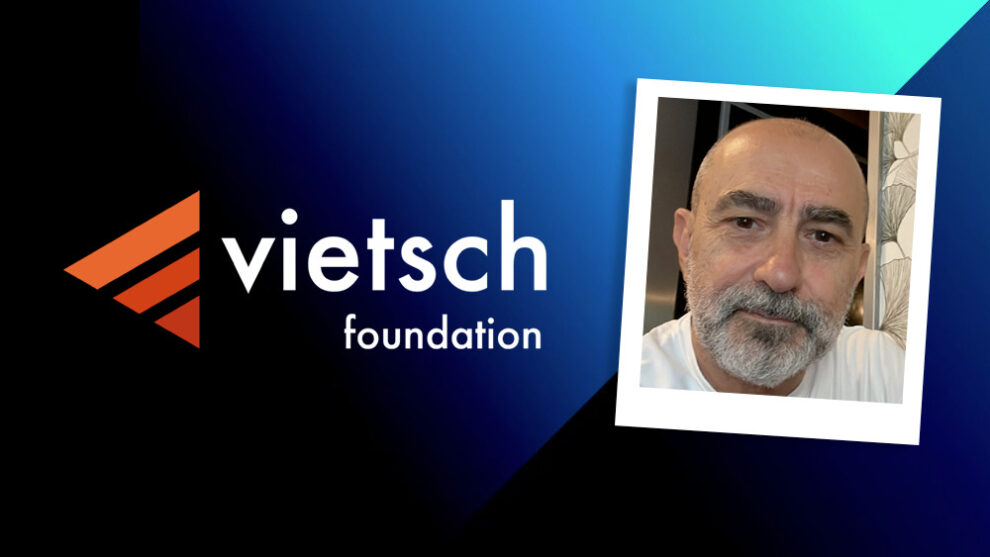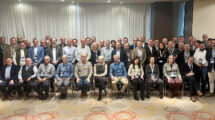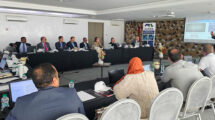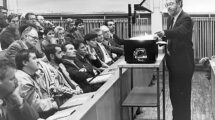Spotlight: Vietsch Foundation
CONNECT meets with Valentino Cavalli, Chairman of the Board of Trustees of the Vietsch Foundation, to talk about this Dutch organisation, its mission and projects and the Medal of Honour: the foundation’s accolade awarded to celebrate individuals whose initiatives have greatly impacted the international research and education community. The 2023 Medal of Honour award ceremony will take place alongside the GÉANT Community Award celebration at TNC23 in Tirana, Albania on 6 June 2023.
Valentino has extensive leadership experience in computer networking technologies, strategy and policy development. His 17 year career at the Trans European Research and Education Networking Association (TERENA, now GÉANT) in the Netherlands, started as a Project Development Officer and culminated with the role of General Manager that he retained until he left the association in 2016. Valentino has also served as Open Science officer at LIBER the European Association of Research Libraries, and as Strategy and Innovation Officer at EGI.
Valentino, can you give us an overview of the Vietsch Foundation’s history and mission?
Thank you for asking this question, which gives me the opportunity to remember our founder, Karel Vietsch, who passed away far too young in 2014. Karel had been the Secretary General of TERENA for many years and was held in high esteem within the European research and education networking community. Karel’s work played a big part in his life, and the establishment of the Foundation in his will can be seen as a way of furthering his dedication to the community. He defined very clearly foundation’s mission, modus operandi and structure. We started on 23-02-2014 with two goals: funding project developments showing the potential to support the use of the internet for research and education, and the award of a medal of honour to an individual who produced visible and sustainable achievements in a particular field of research and education. Since its launch, the Foundation has funded 18 projects in various areas, ranging from network traffic and routing (eduDNS, ADDITIONAL, both funded in collaboration with the GÉANT Innovation Programme) to user-level services (eduVPN, Science Checker, MARLIN) but also policies (trusted students ID framework, digital rights) and publications (Free and Open Source: Law, policy and practice). We received and funded proposals from several applicants, including our MOU partners, NLnet and EUNIS, as well as GÉANT and NREN affiliated organisations, but we also look for projects and welcome new funding applications from the community all the time. So far, the medal of honour has been awarded to well-known individuals in the networking community, but also to champions of technologies and services in other communities, such as Open Science.
What does the Medal of Honour represent?
The medal is a recognition of an individual’s achievements over time, we don’t just look at ingenuity and innovation, we are primarily interested in the success and sustainability of those achievements. The winner is independently chosen by the trustees of the Foundation, we accept applications from various communities, but we often carry out our own research for valid recipients. When deciding on the award we always bear in mind the instructions we were given by our founder and strive to respect the spirit of his will. The first medals were awarded in 2015 to Roland Hedberg and Andrew Cormack, a good friend of Karel, who a year later became a Trustee of the Vietsch Foundation. Sadly, Andrew passed away in April this year and I’d like to take the opportunity to pay a tribute to his outstanding and lasting contributions to our community.
What does Karel Vietsch’s legacy mean to the international R&E community and to you personally?
As the Secretary General of TERENA Karel Vietsch was instrumental in shaping the organisation together with its governing bodies and members. During his mandate, TERENA was put on solid and transparent financial grounds, doubled its size and launched new initiatives and services which were very much valued by its members and well respected by research and education communities across the world. Karel was already ill when TERENA and DANTE started merging, but even then he was an attentive and inspiring player whose advice was appreciated by the involved stakeholders. Karel means really a lot to me: my career at TERENA developed during his years of tenure, and I had the honour to be trusted and valued by him. He was a man who did not talk much about himself, but he was a caring coach and almost a father to me when to the time came to take over from him the responsibility to lead TERENA. I learned a lot from Karel and it was him who chose me as the chair of the Vietsch Foundation. I’m honoured and thankful to be associated with the Foundation that carries his name.
Since April 2022 the Vietsch Foundation has been involved in a project to support R&E in Ukraine during the war. How is this initiative progressing?
Thank you for giving me the opportunity to report on the support that the GÉANT community is providing to the research and academic community of Ukraine during these difficult months of war. Since the project started we collected funds donated by GÉANT members and even by some of their employees and wired them to the URAN Association. Those funds have helped to maintain operation of essential services and support the Ukrainian NREN’s employees and their families. This year we funded also a power generator, which was shipped all the way to Kyiv from Poland in January.
We understand that unfortunately you will not be able to join us at TNC23 in Tirana, but could you share with our readers your best memory of TNC and why?
Indeed, it’s a pity that I cannot be in beautiful Tirana with you; in my early days at TERENA I was able to support the Albanian NREN and I would have loved to meet all my old friends from GÉANT there. I have so many good memories of TNC. The first is the amazing social event organised by GARR during TNC2006 in Catania, at Palazzo Biscari, a luxurious aristocratic palace near the cathedral: it felt like being on the set of the Leopard (Italian: Il Gattopardo), a movie which many of us might have seen and loved. Another, a more personal memory, is from TNC2012 in Reykjavik. TNC was held just a few months after I became Acting Secretary General and was a sort of baptism of fire: everything was so exciting there, but one thing I praise above all, was the start of what I called the “Reykjavik Group”, an initiative taken by some members of the TERENA and DANTE directors to assess the governance of research and education networking in Europe. That work might have been forgotten by some, but it pioneered the ideas and formulated the first recommendations for what later became the formal and successful merger of the two historical organisations into GÉANT.







